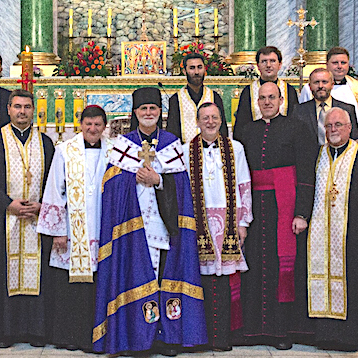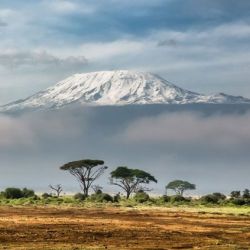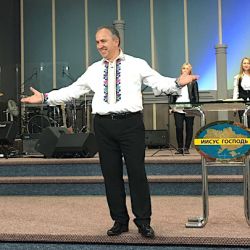In line with the Social Weeks of France created over a hundred years ago to reflect on the social implications of the Gospel, this week's theme (actually three days) was "Dignity-service-solidarity. Towards a renewed country ".
It would take a whole article to account for the wealth of contributions. I remember this thought of the political scientist Yevgen Hlibovytskyi: “The catastrophes that Ukraine experienced (Chernobyl, war, corruption, lack of security) tell us one thing: you must be human!” In this article I will limit myself to the question of the search for Christian unity.
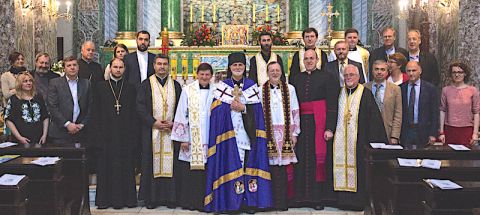 Ecumenical celebration in S. Alexander Cathedral. Kiev. June 8, 2017
Ecumenical celebration in S. Alexander Cathedral. Kiev. June 8, 2017
The path of peace
This meeting began with an ecumenical celebration in S. Alexander Cathedral. The Apostolic Nuncio, Mgr. Claudio Gugerroti said these strong words: “The problem of unity is not a social problem. The division is an injury to the body of the Church, for Jesus asks for unity. It is not optional. If the Father and the Son are one, we cannot be divided, otherwise we offend the unity of the Trinity”.
Boris Gudziak, bishop of the Ukrainian Greek-Catholics of France, Benelux and Switzerland remembers that, under the Soviet regime, this cathedral had been transformed into Institute of Atheism, where he did his doctoral thesis. “Ecumenism makes us return to the sources: Jesus died and rose again. The postulate that Christ proposes to us and to which we will never be able to give up is paradoxical: if you want to be first, you must be last. The grain must die to bear fruit. To enter life you have to wear your cross”.
The representative of the Kiev Orthodox Patriarchate emphasizes that the gifts of Christ must be shared with all. “To begin together with a prayer, even if we are few, is the sign that God is blessing this manifestation”.
As for Anatoly Kozachok, bishop of a Pentecostal Church, he notes that seeking interfaith peace also means seeking peace in the country. Christ has shown the way to this peace by making himself poor.
The unity of Ukrainian Christians. A new format.
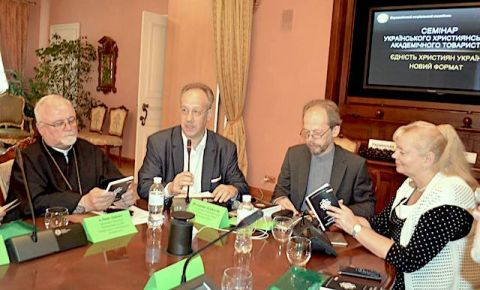 From left to right: P. Iwan Dacko, Antoine Arjakovsky, P. Georgi Kovalenko, Halyna Bohonko
From left to right: P. Iwan Dacko, Antoine Arjakovsky, P. Georgi Kovalenko, Halyna Bohonko
Here I launch a round table on the theme of Unity of Churches held at the Open Orthodox University of Hagia Sophia.
In Ukraine 67% of people consider themselves religious. Of these 68% are Orthodox. Churches are growing, but indifference is growing even faster.
Fr Iwan Dacko, President of the Institute of Ecumenical Studies in Lviv, speaks of the desire for unity as a path to the communion of churches. Christians fall into two categories: those who want unity and those who do not want it. “Where there is a will, there is a way”…
Simona Merlo, from the community of Sant Egidio, talks about the ecumenism of mercy. Friendship with the poor unites Christians. This community, well present in Ukraine, makes the experience here.
The Pentecostal pastor Mykahilo Cherenkov, whom we had already met, proposes a Protestant perspective on unity: “A divided Church has nothing to say to the divided world. No one should reject its traditions, but all have to discover the benevolence of God and open themselves to dialogue. The confrontation does not lead to anything. It is only by coming out of isolationism, the Church can be useful to society”.
For the Dominican Wojciech Suruvka, guessing what the new format of the unity will be, is difficult. “Only the Holy Spirit knows it! But we can indicate which factors should be kept to go to this unity”. According to him, the Church must have four principles: tradition with James, freedom of the Spirit with Paul, love with John, pastoral service with Peter. “Problems come when we absolve a principle. To arrive at a new format, we must keep these principles in balance, both in and between our churches”.
Another Dominican, Petro Baloh, recalls that the Church of Christ remains one from the beginning and cannot be divided, despite the diversity of confessions and traditions. But this invisible unity is not enough. To love one's brother must be visible. Christian unity must be visible on earth, not just in heaven. It must be a goal for our earthly pilgrimage.
Some testimonies about JC 2033
During this “round table”, I briefly presented the movement around the two thousand years of the resurrection of Christ which is the reason for our coming to Ukraine. Here are some testimonials from personalities we met:
Fr. Georgi Kovalenko, founder of the Open Orthodox University: “For such an event, we must invent a new format of celebration: leaving our churches and opening ourselves to the world. It must be different”.
On the same line, the president of the “Oriental work” - a work that builds bridges between France and the Eastern Churches - Mgr. Pascal Gollnish, said: “What interests me is not so much celebrate between Christians the resurrection of Christ in 2033. I think of Jesus who prayed for unity so that the world might believe. What word do we have for the world to believe”?
Constantin Sihov, director of the Center for European Studies of Kiev University is surprised by this initiative. “Will a globally orthodox country accept this idea from elsewhere”? This message must be enculturated so that people can grasp that this opportunity to witness together the resurrection of Christ is not a confessional message. neither policy”.
Antoine Arjakovsky, director of studies at the Collège des Bernardins (of Orthodox confession) finds the idea of anticipating 2033 excellent: “I dream of a year 2033 when local communities open to the world by showing love, joy, justice and peace of the Kingdom of God. And the blow of being able to commune together with the saint Chalice. This would be a magnificent testimony! "
Pray for Ukraine
This ecumenical meeting ended with a magnificent concert given by several folk groups in front of the new Greek Catholic cathedral of the Resurrection.
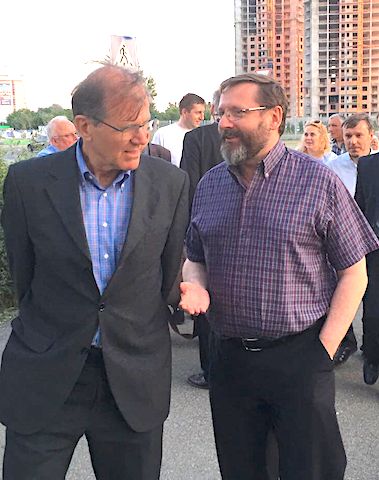 On the way with Siatoslav Shevshuk, head of the Ukrainian Catholic Church of Ukraine.
On the way with Siatoslav Shevshuk, head of the Ukrainian Catholic Church of Ukraine.
During the meal that followed we had a long conversation with Bishop Siatoslav Shevshuk, Patriarch of the Greek Catholic Church. This young leader listened to us with attention and fraternity. Member of the Pontifical Council for Christian Unity, he is passionate about Christian unity.
“For us Byzantines, Easter is the feast of holidays, the joy of joys. Every Sunday we relive Easter with a strong presence of the Risen Christ”, he says. We spoke in particular about the notion of “Jubilee” which does not have the same meaning between Catholics and Protestants: “I know Pope Francis well, because I was bishop in Buenos Aires. I will write to him about the question of an ecumenical jubilee”!
Before leaving us, he urged us not to forget the Ukraine in our prayers and to inform the churches of Switzerland about this “forgotten war”. “We need your prayers without which we cannot get out of this inextricable situation”!
It was beautiful to end our visits to a cathedral dedicated to the risen Christ. It is he who will guide and unite the Church in the beautiful Ukraine, so complex and so wounded by tears of all kinds. No pain or division is foreign to him since he has traversed them all. He is the secret of all renewal.
Ukraine is undoubtedly also a laboratory for the JC 2033 movement. So many diversities, so much dynamism and potential within so much pressure! No doubt a place to return.

